Telemarketing and “cold-calling” can be useful and inexpensive ways to make your business more recognizable. However, this type of marketing should be approached with caution. There are several rules in place which protect the public from the hassles of dealing with unwanted telemarketing, and the penalties for violating these protective acts can be steep.
Telephone Consumer Protection Act
Signed into law in 1991, the Telephone Consumer Protection Act (TCPA) restricts telemarketing and the use of automated telephone equipment and programs designed to send “mass” solicitations by automated dialing systems, pre-recorded messages and SMS text messages.
It is important to recognize a person solicited in violation of the law can sue the marketing party. Furthermore, the Act provides for strict liability which means if a REALTOR® violates the TCPA, even unintentionally, they can be held liable.
The TCPA specifically directed the Federal Communications Commission (FCC) to create a way for telephone subscribers to avoid unwanted telephone solicitations. The TCPA imposes time and identification restrictions on all telephone solicitations. For example, telephone solicitations may not be made prior to 8 a.m. or after 9 p.m. and the caller must provide the called party with their telephone number or the address of the party on whose behalf they are calling and where they can be contacted.
More information on telemarketing
Visit the Illinois REALTORS® Legal A-Z page, which you can access using your member log-in (www.illinoisrealtors.org/legal/legal-a-z/do-not-call). The National Association of REALTORS® offers telemarketing tips at (www.nar.realtor/telemarketing-cold-calling).
Illinois REALTORS® also has Form 351, “Rider to Brokerage Agreements,” which provides consent by the consumer to be contacted by any available method of communication (www.IllinoisRealtors.org/legal/forms).
National Do Not Call Registry
The rules also resulted in the National Do Not Call Registry, a database of telephone numbers available through the Federal Trade Commission (FTC) website that cannot be called (or texted) for purposes of solicitation. Do Not Call rules apply to both residential and cellular phone numbers that have been placed on the list.
In the real estate business, the registry prohibits any telephone call to a residential (or cellular) telephone subscriber which would be made for purposes of encouraging the use of the services of a real estate brokerage company or its agents; or the purchase, rental or investment in any real property or inventory of the real estate brokerage company.
It is the responsibility of the brokerage using a telemarketing campaign to check the National Do Not Call Registry before reaching out to consumers. The registry is continually updated by the FTC and accessible by going to https://telemarketing.donotcall.gov.
In addition, the Rules require any brokerage that conducts telephone solicitations to maintain its own company-specific list of residential telephone subscribers who do not want to be called. Therefore, if a party requests not to receive further phone solicitation in response to a cold call, no one else from that brokerage can place a phone call to that party.
The brokerage must also create and maintain a written company policy addressing both the use of the National Do Not Call list, and the company-specific list. The policy must be made available upon demand of an investigating agency.
Furthermore, any brokerage that engages in telephone solicitation must also provide training to its personnel (and independent contractors) regarding the existence of the National Do Not Call list and the proper use of the list.
Know the rules
In order to make certain your brokerage is following the Telephone Consumer Protection Act and the National Do Not Call Registry rules, do the following:
- Comply with the time limits (between 8 a.m. and 9 p.m.) and identification restrictions for all telephone solicitations.
- Establish a pattern of checking both the national Do Not Call list and the brokerage company-specific DNC list and establish company procedures for maintaining the company’s list.
- Provide training to all licensees and personal assistants regarding the use and application of the DNC lists.
- Comply with the consent, date, time and identification restrictions on messages sent via text or facsimile.
Telemarketing by text
In these busy and competitive times, it can be tempting to try contacting potential clients by automated telemarketing text messages. However, soliciting clients by text requires an additional layer of precautions for a brokerage. Telemarketing texts are those texts initiated for purposes of encouraging the purchase, rental of, or investment in property, goods or services.
A telemarketer who wants to use this type of mass solicitation must obtain a written and signed consent form that clearly and conspicuously discloses that the recipient authorizes the sender to deliver messages and that is not conditioned upon outside factors.
Non-telemarketing text messages only require prior express consent, and consent can be given verbally, in writing or by voluntarily providing a cell number. In the event of an allegation of a violation, the soliciting party will have to prove that consent to receiving text messages was obtained prior to contacting the consumer.
Therefore, REALTORS® should establish a practice of following up with written confirmation even if verbal consent has been provided for contact by text. A personal or company attorney can advise how to add language for forms on which a potential client provides a cellular number, and that they are consenting to the receipt of text messages.
Finally, any system that is put in place by a REALTOR® for solicitation by text message must include an “opt out” procedure for the solicited parties. For example, the solicited party might be able to reply to the text using “STOP” to avoid future contact. This “opt out” option must be clearly communicated in all solicitations.
REALTORS® should be aware that violations of the texting rules can be up to $1,500 per violation, and that would apply to each consumer who was inappropriately contacted.
Make sure to check your brokerage company’s policy, which may contain a blanket anti-solicitation policy. Even so, your company must have a written Do Not Call policy and a method for creating an internal company specific Do Not Call list.
Have a legal question?
The Illinois REALTORS® Legal Hotline is the Designated REALTOR®/managing broker’s go-to source for legal information.
Hours: 9 a.m. – 4 p.m. • Monday – Friday
Phone: 800-952-0578
Email: [email protected]




 Create professional development programs that help REALTORS® strengthen their businesses.
Create professional development programs that help REALTORS® strengthen their businesses.
 Protect private property rights and promote the value of REALTORS®.
Protect private property rights and promote the value of REALTORS®.
 Advance ethics enforcement programs that increase REALTOR® professionalism.
Advance ethics enforcement programs that increase REALTOR® professionalism.
 Protect REALTORS® by providing legal guidance and education.
Protect REALTORS® by providing legal guidance and education. Stay current on industry issues with daily news from Illinois REALTORS®, network with other professionals, attend a seminar, and keep up with industry trends through events throughout the year.
Stay current on industry issues with daily news from Illinois REALTORS®, network with other professionals, attend a seminar, and keep up with industry trends through events throughout the year.







